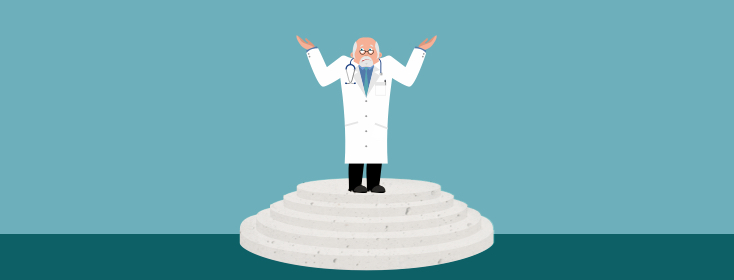Doctors Sometimes Need Advice Too
How many of us have lived with the notion that the doctors with whom we interact know everything about the medical circumstances we find ourselves in? That they are smarter and certainly more knowledgeable than their patients? That they are there to answer our questions...not to ask us questions?
Answering questions for ourselves
I recently found that others in an online lung cancer forum are asking the same types of questions I've grappled with over the years. We tend to place our doctors, especially when they are specialists, on pedestals, yet they, like any other professional, cannot know everything pertaining to every case they encounter. There are too many variables, and research is changing the playing field on a constant basis.
Now, more than ever before, the Internet has allowed virtually everyone to have access to research materials that could only be found in the best university medical libraries only a decade or two ago. Not just that, but many patient support communities are filled with brilliant people who willingly share what they are learning about lung cancer, its causes, treatments and ongoing research. This is ultra important as we seek the best answers regarding our individual needs through our communications with our own medical teams.
What every doctor should do
With that lengthy lead-in, I offer these suggestions for things our physicians can and should do in their clinical visits with patients. (Feel free to add your own in the comments.)
- The doctor should sit at the same level as the patient and they should show empathy. You know, "there but for the grace of God go I."
- The doctor should never, ever patronize a patient or talk down to him. For many of us, this is the quickest way to cause antipathy in a doctor/patient relationship.
- The doctor should not assume that just because a patient is Stage IV, he or she is terminal. He should be willing to think outside of the box, as new research is unleashing life-extending treatments with a speed unknown only a few years ago.
- The doctor should expect many patients to be very well informed about their disease circumstances and potential treatment options for it. Sometimes, the patient may even have information the treating physician has not yet reviewed. After all, the doctor is treating hundreds of patients, often with different types of cancer and different treatment needs. The patient has one person's needs to know and research.
- The doctor should make every effort not to rush a patient visit or to downplay or even ignore questions the patient has. Unfortunately, doctors are often overbooked and struggle to meet the time demands, but letting this struggle show to the individual patient can cause him to feel more distressed in a situation that is already out of his control.
- The doctor should not assume a patient knows what he means because that patient doesn’t have a question immediately formulated when new or distressing news has just been delivered. The doctor should make sure any important information seems to be understood before the appointment is concluded.
- The doctor should address the financial aspects of the diagnosis. If he cannot adequately do this, he should direct the patient to the clinic's insurance/finance advisory person. Because cancer care is so expensive, this area cannot be dismissed, as many patients can quickly fall into financial hardship and need to know where to turn.
Giving thanks to our doctors
Our physicians have studied and worked very hard to provide the medical care we need and expect from them. I applaud them as a profession. It is both a wonderful calling and a thankless complexity that they endure as they try to serve the hundreds of thousands of us with lung cancer, a disease that continues to confound even the most learned among us.
(I have used masculine pronouns as a matter of convenience, but they are meant to represent both male and female physicians and patients.)
Editor's Note: We are extremely saddened to say that on June 8, 2019, Karen Loss passed away. Karen was a valued member of the lung cancer community and an incredible advocate and avid writer. She will be deeply missed.

Join the conversation